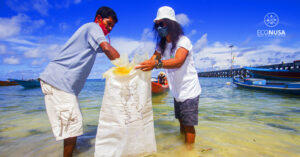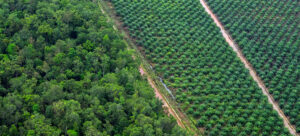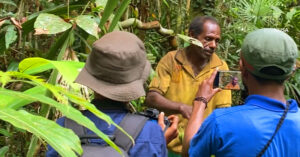
The beauty of the fauna from Raja Ampat, Papua is unmatched. One of the interesting fauna is the spotted carpet shark. Indonesian marine endemic animals are well known to foreign countries. The spotted carpet shark can attract attention because it has a beautiful body complexion. He has brown skin color and spotted like a leopard. The patterns that are spread throughout the body are round and not perfect and black. Of course the appearance is not as scary as sharks in general.
The spotted carpet shark has a carpet-like body and is not much different from most sharks. He has a mouth that is not too sharp, the fins on the side, and two fins on the back typical of most sharks. The shark that belongs to the Hemiscyllidae family has the scientific name Hemiscyllium freycineti and belongs to the type of bamboo shark.
The maximum length of this animal is approximately 46 cm. Usually these sharks eat small types of invertebrate animals, such as insects, jellyfish, earthworms, and others. Even though they are small and eat small animals, spotted carpet sharks should never be underestimated! He can also prey on animals with a size far greater than his body size.
These sharks swim in shallow seas, we can find them at depths of 0 to 12 meters below sea level. Its habitat in the shallow sea is full of coral reefs, seagrass and sand. Even so, we will be a little difficult to find spotted carpet sharks, because of his habit of disguising among coral reefs.
Unfortunately, the shark that began to be known in 2003 is expected to become extinct in the next 10 years. Now spotted carpet sharks belong to protected animals. It has even been registered with the World Wildlife Fund (WWF) as an endangered animal. This is due to large-scale shark capture and damage to coral reef ecosystems, home to spotted carpet sharks. Many irresponsible people who catch fish using explosives, so that coral reefs are destroyed and sea water pollution occurs. Not only that, because it is known to have a high price, hunting spotted carpet sharks continues to increase, it’s no wonder the numbers are now getting smaller.
Our job is to always protect their habitat and not be part of the chain of hunting sharks. Don’t let the spotted carpet shark become a legend in 10 years!







